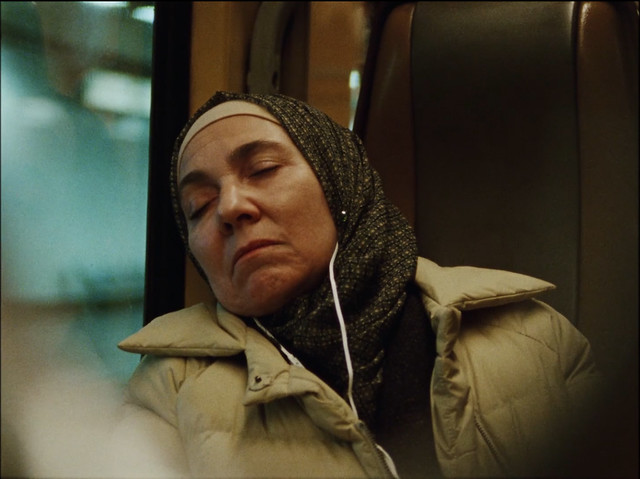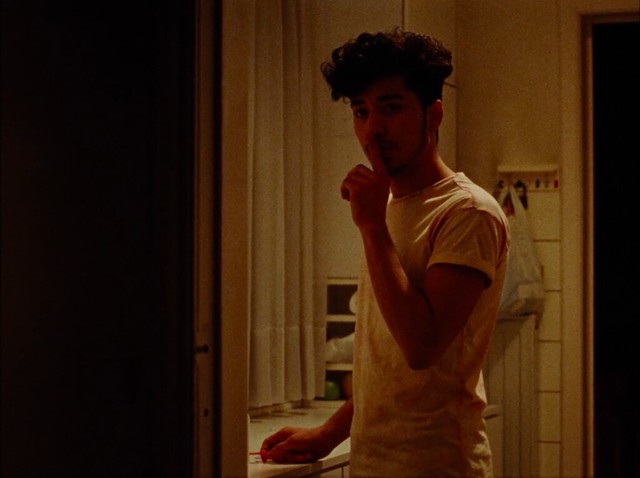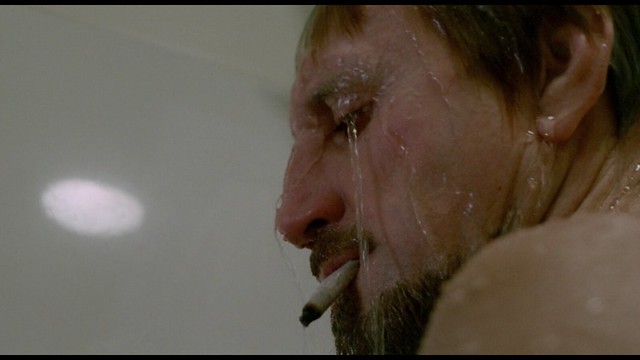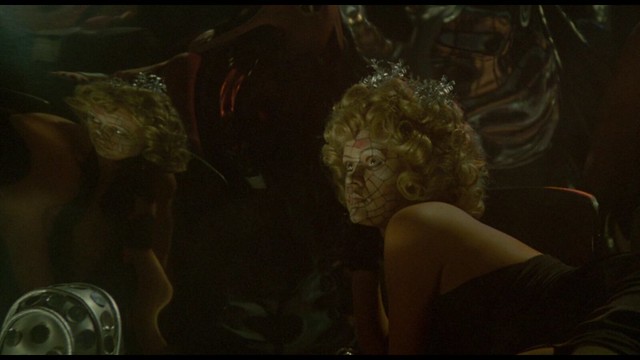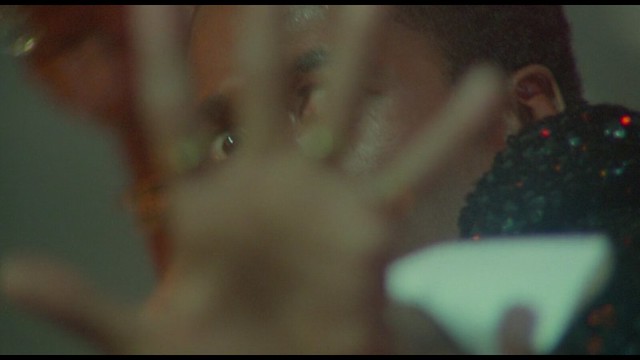This list reflects my tastes and preferences only. Please keep that in mind. Not in any order. Please suggest some good Japanese films from the last decade.
Japanese Girls Never Die (2016) - Matsui

With its intentionally jumbled chronology, Japanese Girls Never Die goes on to tell the story of Haruko (Aoi Yu), an aimless 27 year old who works at an office and still lives at home. Then there is an accidental graffiti artists and an anarchic High School girl gang on a crime spree, beating up unsuspecting men subplots. In series of flash forward, we learn Haruko hooking up with a grocery store clerk/childhood playmate, Soga (Ishizaki Huey). She has to deal with daily sexism at work place - hearing male superiors shit talking 35-year old, unmarried female co-worker and constantly being asked whether she has a boyfriend, then told she won't have problems getting married because how she looks. They even say to her point blank that they'd rather hire a 18 yr old girl with no experience rather than a male applicant with experience because they have to dole out more money for a male workers.
Then she goes missing. Yukio and Manabu, two 20 yr olds working dead end jobs and Aina (Takahata Mitsuki), a slightly pumped up version of cutesy Japanese girl decked with a blinged out cell phone and a gaggle of flush toys on her car dashboard, start stenciling Haruko's face from the police missing sign all over the neighborhood walls. The image goes viral and gets tied into the violent crimes perpetrated by the girl gang. In her absence, Haruko becomes a unwitting heroine of a movement.
Japanese Girls Never Die is a strong indictment of the society where girls are subjugated and sexualized at an early age. It's a structurally daring, thought provoking work. Aoi Yu, the baby faced star of millennial classics like All About Lily Chou-Chou and Hana and Alice does a great job, carrying the burden of being twenty something female in society where self-worth is hard to come by. It's crazy to think that Aoi is old and therefore can easily be discarded. What kind of world is this? Even though it's more than a decade apart from each other, it would make a great double feature with Kurosawa Kiyoshi's Bright Future.
0.5mm (2014) - Ando
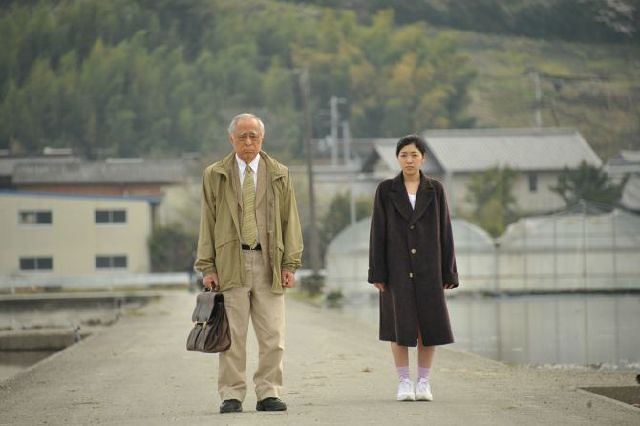
Clocking just over 3 hours, 0.5 mm tells a sprawling journey of a young caretaker of elderly people (director Ando Momoko's little sister, Sakura) as she travels through Japan. It's a comical, tender and deadly honest look at aging Japan and its seemingly unbridgeable generation gap.
Sawa (Ando Sakura), is a comely caretaker of an bedridden old man- she changes his diapers, cleans his fluid tubes and feeds him every day. The man obviously hasn't long to live. Sawa expertly handles it all. One day, the man's daughter asks him if she's willing to sleep with the dying man- that it is his dying wish, and assuring her that he is quite flaccid. Breaking the agency protocols for a large sum of money and compassion, Sawa agrees to go through with it. But it only ends in a disaster that costs the old man's life. Something breaks in Sawa and she takes off on the road.
Without any money, she witnesses an eccentric elderly man (Inoue Tatsuo) who's compulsively going around town stealing bicycles and puncturing tires. She blackmails him into pressing herself into his life as his live-in caretaker. There are many funny moments in this prolonged segment as Sawa flirts and disinfects his desires, fights off a sleazy scammer of elderly people, until he decides to go to the fancy retirement home, leaving Sawa his long, worn-out winter coat and his beloved old vintage sport car which has been sitting in his garage.
Sawa moves on to another elderly man, a former professor (Tsugawa Masahiro), who pretends to go to teach every morning, but instead hangs out in the mall all day and spends his time looking at dirty magazines instead. No challenge is small for Sawa, as she pushes herself into the professor's life, guising herself as a former student and admirer of the professor, she forms an uneasy alliance with his older housekeeper and caretaker of his bedridden wife. Sawa insists upon taking care of the wife, who must have been a cultured woman, as she sings arias in the middle of the night. The professor was a navy captain in the war. He reflects contemporary Japan's directionlessness. With the collective will of the people, they could've moved a mountain 0.5mm if they wanted, back then. Just like his wife, he too, slowly loses his mind to aging.
Sawa travels to a small fishing village where she meets a slovenly mute boy whom she's known before and follows him to a shack where his brutish scavenger father lives. The boy turns out to be a girl underneath all the baggy clothing and Sawa and her father has several physical altercations.
With these encounters, Ando takes a current snapshot of Japan, where elderly population problem needs to be dealt with. That they need to be respected and seen with compassion. She also vilifies the post war generation who lacks compassion. They are passing responsibilities of taking care of elderly on to the directionless younger generation. In the center of 0.5mm is brave, ferocious, magnificent Sakura Ando. Not afraid of the physicality and wackiness of her character but also conveys deep compassion and understanding Sawa has for her elderly counterparts. With 30 percent of Japan's population over the age of 65, it's no surprise that Japanese cinema is the first to tackle growing elderly population problems. Biting, uncompromising and deeply poignant, 0.5mm is an impactful film mostly because its untethered, sprawling narrative. There are certain new breed of Japanese indie-filmmakers who totally ignore the typical 3-act narrative structure- Sono Sion, Aoyama Shinji come to mind. I see Ando is also the cut of the same cloth. There is a sense of freedom, freshness to their storytelling.
Asako I & II (2018) - Hamaguchi

Asako (Karata Erika), a passive young girl eyes a tall, good-looking boy, Baku (Higashide Masahiro) at a gallery. With the sound and smell of firecrackers set by rowdy school boys still ringering in the air, they kiss and hook up, just like that. They become a young couple very much in love. Asako's dependency on Baku is total. But always aloof, he disappears for days on end without explanation. Her friends warn her that he will break her heart one day. And one day, Baku goes out for errand and never comes back. At this point, I am expecting some existential, poetic drama along the lines of Maborosi or Before We Vanish. But I'm wrong.
It's been five years. Asako relocated from Osaka to Tokyo, has an stage actress roomate and works at a coffee shop. While delivering coffee at a coporate conference at the building across, she is shocked by a presence of Baku. But it's not him. His name is Ryohei (Higashide again in a double role) who works for a sake sales company. In turn, Ryohei is extremely intrigued by Asako who seem to have an extreme aversion to his presence. It's her shy but clear, direct stares that draws him in. After multiple attempts with the help of his Chekov quoting, English speaking colleague as a wingman, they hook up. It takes a long time for Asako to finally get over her first love and fall in love again to another man, a very different man who is down to earth and real.
Then Baku shows up in Asako's life again. Now a famous model, he turns Asako's life upside down.
Based on Shibasaki Tomoka's novel Netemo sametemo - Waking and Dreaming, the film tackles on letting go of the first love from a woman's point of view in a very unique way. Hamaguchi has a great sensitivity dealing with delicate subject and make his actors shine. Young Karata embodies depth and mystery of a young woman coming out of her shell without compromising her core self, while Higashide shines in dual roles with great empathy and maturity. All the supporting roles are also great and well drawn out. It is refreshing to see a Japanese film that is modern and direct and not trying to be overtly Ozu-y or arthouse poetic or genre-y, yet very Japanese. I very much appreciate Hamaguchi Rusuke's work.
It Feels So Good (2019) - Arai

'What would you do in the face of impending doom?' is the question posed on Kenji (Emoto Tasuku, Your Bird Can Sing) and Naoko (Takiuchi Kumi, Greatful Dead) in It Feels So Good. Writer/director Arai Haruhiko's new film, based on a novel of the same name by two time Naoki Literary Prize winning novelist Shiraishi Kazufumi, written right after Fukushima nuclear meltdown, sees a couple in the precipice of another major natural disaster in Japan.
It starts out with Kenji, unemployed thirty something divorcee seen on a riverbank, fishing half-heartedly, then getting a phone call from his unseen dad informing him that his cousin, Naoko, is getting married. Would he be able to come down from Tokyo and attend?
Naoko is getting married to an older career military man, who is in charge of disaster relief missions, in five days. He is involved in some National Security briefings right now. It turns out Kenji and Naoko share a past: they both were young and very much in love. Naoko even kept graphic photo album full of their sex acts taken by themselves. They tried every position, and everywhere. They used to explore every inch of each other's body. The memories of their affair come flooding back and they can't keep their hands off each other. They will continue to have sex until the day Naoko's fiance returns.
Arai makes sure that we see Kenji and Naoko and them only. We are invited into the couple's intimate bubble. No one else is seen and only heard occasionally on the phone. They go out to restaurants and street festivals, but the camera is only concentrated on them. But mostly, we see them having sex in his old mother's house, her parents house and her big empty new home which she will move in with her husband after the wedding.
Emoto and Takiuchi give commited, brave performances as lovers against socital norms and impending natural disasters. They have great chemistry together.
It is slowly revealed why they are not together. Kenji got someone pregnant and had to marry. Naoko only wants to marry the military man because she wants to have a baby. Obviously they have made some bad choices in their lives, they realize. Incest among cousins is looked down upon in Japanese society. But Japan is also a few countries which allow the first cosins to marry. There is a talk of inevitable eruption of Mt. Fuji, the sacred mountain of Japan. They reminisce about how they made love in front of the large picture of the caldera of Mt. Fuji, swearing their love into the volcano, as if sacrificing themselves to the mountain gods. They even took a picture to commemorate that night. Would they go their separate ways when Naoko's fiance returns?
It Feels So Good's theme is letting all your inhibitions go and live your life the way you want to, because it will all end anyway. Living in a country where natural disaster is way too common and people lead perpetually suspended in temporary existence, Ken and Naoko realize, it's now or never. From their point of view, their behavior might come across as nihilistic, but they are portrayed with much warmth and humanity by Emoto and Takiuchi. If we are to die tomorrow, who are we to judge how others led their lives? Intimate, natural and helplessly romantic, It Feels So Good is one of the best contemporary Japanese film I've seen.
A Story of Yonosuke (2013) - Okita

From reading a brief synopsis online of A Story of Yonosuke, and with its 2 1/2 hour plus runtime, and the fact it is a period piece (taking place in 1987), I was fully expecting a Being There or Forest Gump type parable steeped in a socio-political survey on Japan's economic boom and its downturn in recent years. In a way the film is a parable, but in the subtlest terms.
It's a winsome tale about an affable young man named Yonosuke (a funny sounding name, I was told), who is not mentally handicapped nor an ethereal butler who may or may not exist. Rather, he is a regular guy who still manages to touch many lives with his gentle, optimistic nature.
Even though the film's periodic details are astutely recreated and observed, it is not the nostalgia piece where someone would say, "Yes, I remember the Yomiuri Giants winning the world series that year". As you delve into Yonosuke's life, it makes you forget the film's artificial backdrop soon enough.
Yonosuke, a college freshman from Nagasaki, is played by Kora Kengo (Norwegian Wood, Woodsman and the Rain). His sharp features and intensity are diffused by his big fuzzy hair and goofy smile. He is an ordinary, good natured kid whom everyone wishes would be their best friend. Yonosuke first befriends Kuramochi (Ikematsu Sosuke) and Yui (Asakura Aki) (they later become a couple), when they stumble into the school's samba club in an orientation week. They become an inseparable trio. After getting infatuated with an older, alluring 'party girl' Chiharu (Ito Ayumi), Yonosuke unloads his feelings about her on the reluctant ears of Kato (Ayano Go), a reserved man Yonosuke mistakes for someone he knows. They also become best friends. Then he meets Shoko (Yoshitaka Yuriko), a rich industrialist's daughter, who is always chaperoned by a driver and waited by a maid. Their class differences provide many comedic moments in the film. A wide-eyed naif, Shoko falls for good natured Yonosuke right away. She even follows him to Nagasaki for the summer break at a moment's notice, bewildering him and his rightfully suspicious parents. Their courtship is perhaps the most beguiling part of the film: awkward, funny, tender and uplifting- as should any first love be remembered by.
"When I die, would anyone cry?" wonders Yonosuke at his grandma's funeral. It's a question all of us ask ourselves at some point in our lives. "No, everyone will laugh when they think of you." Shoko tells him. And this they do. Throughout the film, director Okita Shuichi unhurriedly inserts people from Yonosuke's life reminiscing about their time with him after some 16 years, without sacrificing the film's gentle narrative flow and without corny sentimentality. Their chance encounters with Yonosuke enriched their lives immeasurably and they feel privileged to have known him.
I take the film as a reminder that beauty and kindness is in all of us, in this time of economic hardship/post-Fukushima Japan. It's a warm hearted, hopeful film subtly realized by Okita and its spirit is beautifully embodied by Kora.
 Hubert Sauper, known for his searing documentaries on the effect of globalization and legacy of colonialism on African continent, in Darwin's Nightmare and We Come as Friends, now turns his attention to the island nation of Cuba. But this time, instead of his journalistic, overtly expansive approach which was necessary to shed a light on the issues that no Western countries knew or cared about, Sauper takes more personal approach in Epicentro, perhaps because Cuba, the Caribbean island nation's reputation as America's longest running foe in such a close proximity, has been a known entity to most Westerners. This doesn't mean Epicentro lacks a bite on exposing and criticizing inhumane US policy on Cuba over the last 50 years and the new exploitation in the form of tourism. Blending cinema historionics and geopolitics Sauper creates something that feels pointy yet ethereal and deeply personal.
Hubert Sauper, known for his searing documentaries on the effect of globalization and legacy of colonialism on African continent, in Darwin's Nightmare and We Come as Friends, now turns his attention to the island nation of Cuba. But this time, instead of his journalistic, overtly expansive approach which was necessary to shed a light on the issues that no Western countries knew or cared about, Sauper takes more personal approach in Epicentro, perhaps because Cuba, the Caribbean island nation's reputation as America's longest running foe in such a close proximity, has been a known entity to most Westerners. This doesn't mean Epicentro lacks a bite on exposing and criticizing inhumane US policy on Cuba over the last 50 years and the new exploitation in the form of tourism. Blending cinema historionics and geopolitics Sauper creates something that feels pointy yet ethereal and deeply personal.
